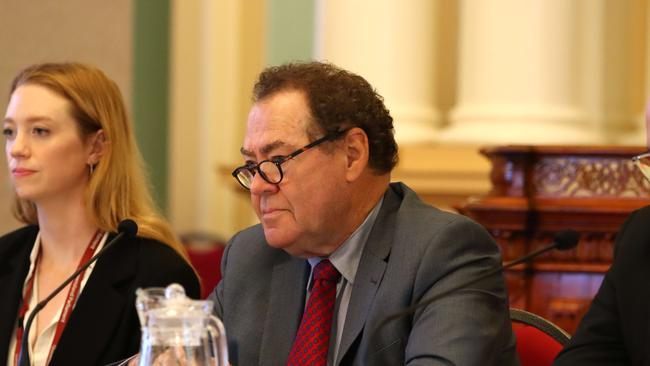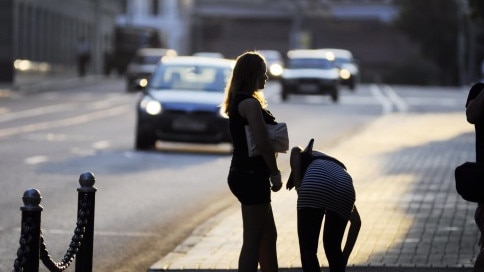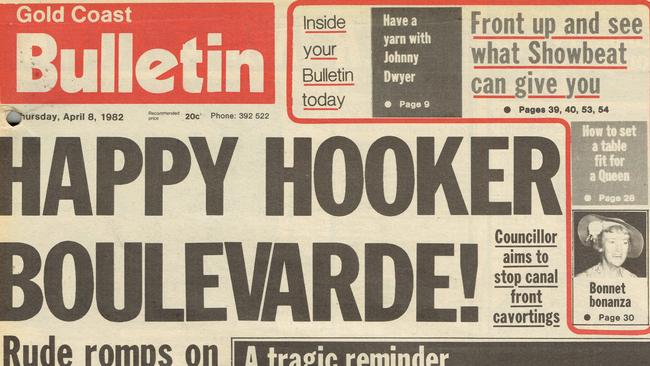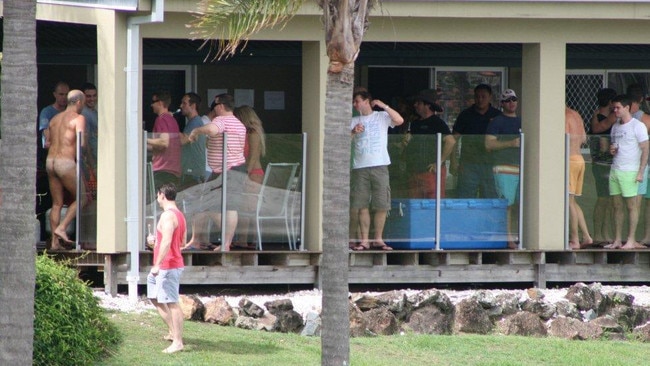Radical law reforms: Hooker Blvd at Mermaid Beach will become a boulevard for hookers
A popular Gold Coast street will become a ‘residential paradise for working prostitutes’ under radical law reforms, state parliament has been told.
Gold Coast
Don't miss out on the headlines from Gold Coast. Followed categories will be added to My News.
Hooker Boulevard on the Gold Coast will live up to its name and become a residential paradise for working prostitutes under radical law reforms, state parliament has been told.
The Palaszczuk Government is moving to decriminalise prostitution in Queensland and regulate it, saying it will protect sex workers from violence and being stigmatised.
The Bulletin more than 40 years ago, before a crackdown on prostitution, detailed how “rude romps on lawns which fronted the canals” were disrupting Coast family life.

Veteran Mermaid Beach MP Ray Stevens predicts prostitutes will return again to the luxury waterfront properties in his suburb with disastrous results.
“I am aware that there is a proposal being promulgated by the CFMEU and the radical left of the Labor Party to allow multiple sex workers to ply their trade in residential areas,” he told parliament.
“This is another example of the extreme left in the Labor Party in control, as no-one with any sense of practical outcomes would allow this flawed policy to become law. “
Mr Stevens said earlier attempts at reform had failed and the Labor Party’s own legislation restricted multiple sex workers to industrial and commercial areas.
“After all, it is a business and I am loath to call it ‘home occupation’,” he said.
Attorney-General Yvette D’Ath said the legislation would be introduced later this year.
“Among the recommendations was introducing workplace health and safety laws for sex workers,” she said.
“It also doesn’t mean there will be no regulation about how and where those businesses or workers operate.
“The Queensland Law Reform Commission’s report involved extensive consultation and engagement with stakeholders and built upon the evidence of decriminalisation in other jurisdictions.”
As former mayor of Albert Shire Council, Mr Stevens recalls employing two big burly ex-coppers in the compliance department who would move freelance sex workers on from residential areas, with some being in high-class suburban streets.

Neighbours would complain about getting knocks on the door at all hours from sex worker clients asking “Does Ruby, Fanny or Antoinette live here”.
“That is quite scary and infuriating. It would be even worse if sex workers are operating out of a Gold Coast high-rise – no pun intended,” Mr Stevens told parliament.
Labor when passing the existing laws argued that controlled and organised brothels in industrial and commercial areas gave safety and security to workers who might otherwise be subjected to pimps and protection men and other criminal activity, he said.
The existing system required health checks when not everyone was 100 per cent socially responsible about caring about passing on sexually communicable disease, Mr Stevens said.
“This (the reforms) will open the door for criminals exploiting the sex industry, with overseas young women being placed in residential apartments and homes without monitoring and due care,” he said.
“I cannot imagine what has prompted this kneejerk reaction from the loony left faction of the ALP.

“But I am sure my communities of Mermaid Beach and Broadbeach will be inundated with promiscuous behaviour in my suburbs and the aptly named Hooker Boulevard in Broadbeach will end up being just that.
“Surely common sense should prevail and this ill-thought, problem-creating, suburb-sabotaging legislation should be abandoned before it sees the light of day in this House.”
In April 1982, the then new Albert Shire councillor Terry Morris called for a crackdown on call girls whom he claimed were invading the residential paradise of the Coast’s canal estates.

Cr Morris said he had received reports from residents who he said were “particularly upset by a massage parlour allegedly operating out of a waterfront house in Hooker Boulevard”.
Residents had complained about “rude romps on lawns which fronted the canals” and about other scenes with men “strolling impatiently up and down in front of the house”.
Cr Morris said residents who moved to the canals for a quiet family life had been unable to hold barbecues in their backyards for fear of being confronted with scenes of men and women “cavorting” on the opposite bank.
The Goss Labor Government after the Fitzgerald Inquiry ramped up policing of the sex industry.

The canal suburbs became “party home central” ten years ago, with bucks parties staged in the rented larger properties. Nude men and woman were photographed by residents.
Residents now fear with the law reforms their suburb will be targeted by sex workers.
In April this year the Palaszczuk Government after an independent review indicated its broad support for the recommendations and announced its commitment to decriminalising sex work.
The Government also committed to “undertake consultation on any future legislation to implement a decriminalised framework”.
Attorney-General Yvette D’Ath said the Government had referred the issue of decriminalising sex work to the Queensland Law Reform Commission in 2021, to consider a model for decriminalisation.
“This resulted in 47 recommendations which the Palaszczuk Government broadly supports.
Among the recommendations was introducing workplace health and safety laws for sex workers,” she said.
“It also doesn’t mean there will be no regulation about how and where those businesses or workers operate.”
Ms D’Ath said theCommission’s report involved extensive consultation and engagement with stakeholders and built upon the evidence of decriminalisation in other jurisdictions.
“Sex work has already been decriminalised in New South Wales, Victoria, Northern Territory and New Zealand,” she said.
“Evidence from these jurisdictions suggests that decriminalising will not lead to an increase in the number of sex workers.
The Government has committed to introducing legislation before the end of the year.”


